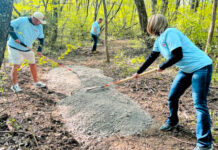After 41 years of performing mulch operations the same way, Timothy Trimmer, senior vice president of Professional Grounds, Inc., headquartered in Lorton, Virginia, says the landscape maintenance/ design/build company completely re-thought their operation. He says that when you’re doing something the same way for so long, making a change isn’t always easy but the effort can really pay off.
In the past, Pro Grounds would get 10,000 yards of mulch delivered to their main office each spring, and then crews would drive 10 yards at a time to the job sites. Trimmer says it was how things were “always done,” but it was incredibly inefficient. Some properties would need as much as 200 yards, which would require 20 trips. As a result, the company would oftentimes sub out those large contracts as it simply became too much to manage.
Recognizing how much time and fuel this method was wasting, Trimmer says they brainstormed a solution. Since the company primarily works with HOAs, they located all of the communities in which they were permitted to stage mulch. Then, instead of just mulching that single property, they would do all of the surrounding properties on that same day.
“There was an obvious concern of us being at the staging site longer than normal, which would raise eyebrows,” Trimmer says. “So instead of just using one crew to mulch as we would have in the past, we would use up to 10 crews per staging site.”
Trimmer says that with the extra crews on hand the company wasn’t at the main staging site any longer than they’d been in years prior. As a result, the communities had no reason to be unhappy. Pro Grounds, on the other hand, was incredibly happy with the result.
Trimmer says that it has meant less drive time for the foremen who were doing mulch deliveries. In most cases they were able to reduce driving times of 40- to 60-minute round trips to just 10-minutes round trip by locating the nearest staging site. That has meant less miles and less fuel. By now being able to use bulk mulch instead of bagged mulch, Trimmer says there were significant savings there as well. In fact, Trimmer says he estimates the savings for the entire operation to be close to $100,000.
“In addition, instead of our crews working all over the county, we now have 10 mulching crews at once who are working in one concentrated area,” Trimmer adds. “That makes quality control much easier to manage. We’ve also found that our crews are able to pull mulch off the truck and work with gravity versus having to pick it up off the ground when we were dumping the mulch and running back to the shop. All around, it’s been a win.”
Our Like a Boss series highlights some common business challenges landscape professionals face and how they conquer them.











![[VIDEO] Dickies®: Discover Workwear That’s Anything But Uniform](https://turfmagazine.com/wp-content/uploads/2023/06/1647663814-4b1a2a7742790a9b1e97a3b963477850192e1d6a9dfba9b07214a77bae25d6e3-d-218x150.jpg)






























![[VIDEO] Dickies®: Discover Workwear That’s Anything But Uniform](https://turfmagazine.com/wp-content/uploads/2023/06/1647663814-4b1a2a7742790a9b1e97a3b963477850192e1d6a9dfba9b07214a77bae25d6e3-d-324x160.jpg)